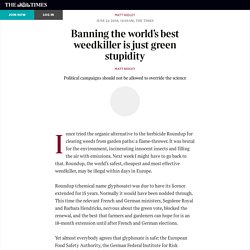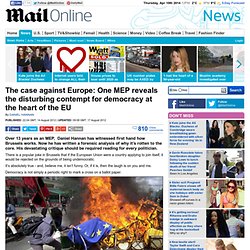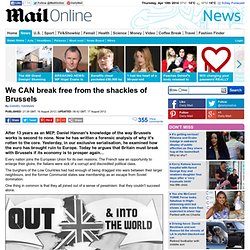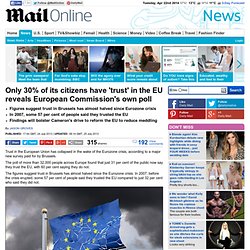

Banning the world’s best weedkiller is just green stupidity. I once tried the organic alternative to the herbicide Roundup for clearing weeds from garden paths: a flame-thrower.

It was brutal for the environment, incinerating innocent insects and filling the air with emissions. Next week I might have to go back to that. Roundup, the world’s safest, cheapest and most effective weedkiller, may be illegal within days in Europe. Roundup (chemical name glyphosate) was due to have its licence extended for 15 years. Normally it would have been nodded through. Yet almost everybody agrees that glyphosate is safe: the European Food Safety Authority, the German Federal Institute for Risk Assessment, the US Environmental Protection Agency, the World Health Organisation, our government. Just one study, driven by an environmental activist working for a body called the International Agency for Research on Cancer, disagreed — a conclusion many disputed.
This episode is part of a wider political campaign. BN71 What EU Comprehensive Approach October 2014.
EU Foreign Aid. European Economy & the Debt Crisis. Britain. Ireland. France. Germany. Greece. Cyprus. Italy. Portugal. Spain. Turkey. Bulgaria. Ukraine Crisis. Democracy in Europe. Waste & Incompetence in the EU. Immigration Problems. The Case against Europe: The disturbing contempt for democracy at the heart of the EU. By Daniel Hannan Published: 22:04 GMT, 14 August 2012 | Updated: 09:08 GMT, 17 August 2012 Over 13 years as an MEP, Daniel Hannan has witnessed first hand how Brussels works.

Now he has written a forensic analysis of why it’s rotten to the core. His devastating critique should be required reading for every politician. There is a popular joke in Brussels that if the European Union were a country applying to join itself, it would be rejected on the grounds of being undemocratic. It’s absolutely true - and, believe me, it isn’t funny. Democracy is not simply a periodic right to mark a cross on a ballot paper. A protester places a EU flag on a bonfire during a riot outside the European Council hall in Gothenburg Sweden It also depends upon a relationship between government and governed, on a sense of common affinity and allegiance. It requires what the political philosophers of Ancient Greece called a ‘demos’, a unit with which we the people can identify.
Got that? The Case against Europe: The rise — and imminent fall — of the euro... By Daniel Hannan Published: 22:23 GMT, 15 August 2012 | Updated: 13:13 GMT, 16 August 2012 Over 13 years as an MEP, Daniel Hannan has witnessed first-hand how Brussels works.

Now he has written a forensic analysis of why it’s rotten to the core. Yesterday, in part one of our exclusive serialisation, he laid bare the EU’s utter contempt for democracy. Today, he examines the rise — and imminent fall — of the euro . . . How did so many clever people get it so wrong? Yet, in every national parliament, in every central bank, in every university faculty, in every BBC editorial conference, there was a collective suspension of disbelief. Why? Sometimes I wonder if it wasn’t so much a case of them liking the euro but more that they disliked the people who opposed it. We CAN break free from the shackles of Brussels. By Daniel Hannan Published: 21:39 GMT, 16 August 2012 | Updated: 06:42 GMT, 17 August 2012 After 13 years as an MEP, Daniel Hannan's knowledge of the way Brussels works is second to none.

Now he has written a forensic analysis of why it's rotten to the core. Yesterday, in our exclusive serialisation, he examined how the euro has brought ruin to Europe. Today he argues that Britain must break with Brussels if its economy is to prosper again... Every nation joins the European Union for its own reasons. The burghers of the Low Countries had had enough of being dragged into wars between their larger neighbours, and the former Communist states saw membership as an escape from Soviet domination. One thing in common is that they all joined out of a sense of pessimism: that they couldn't succeed alone. What might have been: The unsuccessful 'No to Europe' campaign in 1975 Confident and prosperous nations, such as Norway and Switzerland, see no need to abandon their present liberties. Only 30% of its citizens have 'trust' in the EU reveals European Commission's own poll.
Figures suggest trust in Brussels has almost halved since Eurozone crisisIn 2007, some 57 per cent of people said they trusted the EU Findings will bolster Cameron's drive to reform the EU to reduce meddling By Jason Groves Published: 17:44 GMT, 24 July 2013 | Updated: 08:14 GMT, 25 July 2013 Trust in the European Union has collapsed in the wake of the Eurozone crisis, according to a major new survey paid for by Brussels.

The poll of more than 32,000 people across Europe found that just 31 per cent of the public now say they trust the EU, with 60 per cent saying they do not.